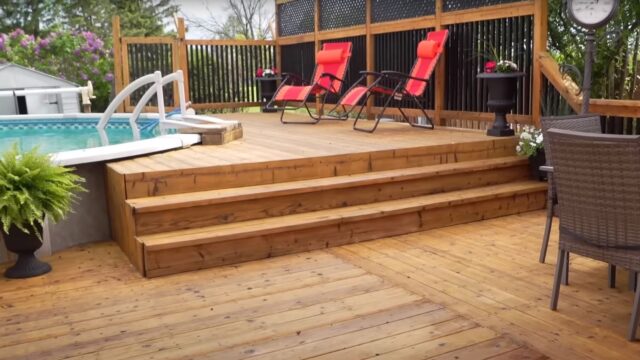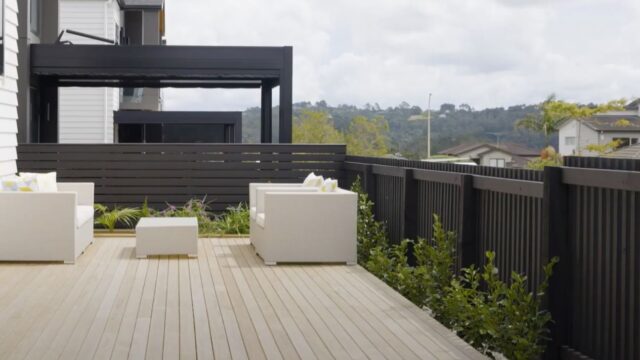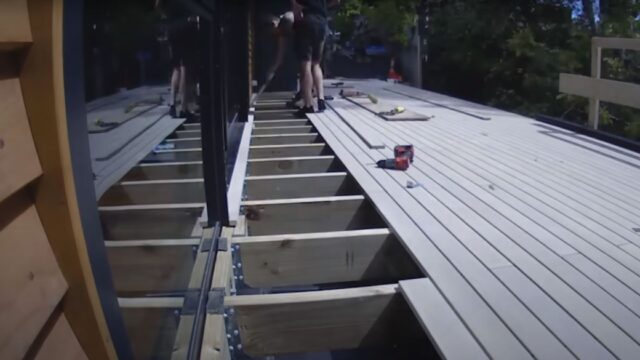Decoding Hardwood and Softwood Decking: A Financial Perspective
The Basics of Timber Decking Choices
When exploring decking Auckland options, homeowners are frequently met with the pivotal choice between hardwood and softwood materials. Both timber categories boast distinct characteristics, advantages, and drawbacks, shaping their long-term cost-efficiency. Let’s delve into the specifics.
Hardwood Decking Choices
Hardwoods are celebrated for their innate strength, courtesy of their dense composition. These woods, extracted from deciduous trees, exhibit an elevated resistance against natural wear, tear, and elemental impact, thus promising enhanced durability.
- Oak: A perennial favourite, oak decking boasts a beautiful grain and is exceptionally hard-wearing. Its natural tannins make it resistant to insect attacks and fungal decay. Suitable for both shaded patios and sun-drenched decks, its adaptability is commendable.
- Teak: Often reserved for luxury decks, teak possesses a golden hue that naturally silvers over time. It’s inherently resistant to moisture, making it an excellent choice for poolside decks or areas frequently exposed to rain.
- Mahogany: With its rich, reddish-brown hue, mahogany decks scream luxury. This hardwood resists rot and decay, especially if regularly sealed. However, sourcing genuine, sustainably harvested mahogany is crucial, given the concerns about illegal logging.
- Jarrah: Another hardwood option, Jarrah, sports a stunning reddish-brown colour. Its natural resistance to weathering, termites, and decay makes it a preferred choice for many Auckland homes, especially those closer to coastal regions.
Softwood Decking Options
Contrastingly, softwoods come from coniferous trees. They might not match the density of hardwoods, but they win hearts with their cost-effectiveness and ease of installation, making them an accessible choice for many homeowners.
- Pine: Radiata pine, particularly popular in New Zealand, is often pressure-treated to bolster its resistance against rot and pests. This treatment renders it a practical choice for ground-level decks or shaded areas.
- Cedar: Western Red Cedar, with its aromatic scent and rich colour palette ranging from amber to reddish-brown, offers natural resistance against rot and insects. It’s a popular choice for decks that seek to merge aesthetics with functionality.
- Spruce: A less common option for decking but still feasible, spruce is lightweight and easy to work with. To enhance its lifespan outdoors, it’s essential to ensure it’s adequately treated against moisture and pests.
- Larch: Another softwood worth considering is larch. It’s renowned for its water-resistant properties, making it apt for Auckland homes exposed to frequent rain showers. Moreover, its golden-brown hue, which gracefully weathers to silver, adds a touch of elegance.
Selecting the right timber for one’s deck goes beyond just cost considerations. It’s a blend of aesthetic preferences, functional needs, and the specific climatic conditions of various Auckland suburbs, like Chatswood or Bucklands Beach. Each wood type, whether hardwood or softwood, carries its own set of merits and potential challenges. Consulting with Auckland deck builders can provide valuable insights, ensuring homeowners make a well-informed choice tailored to their unique circumstances.
The Initial Costs
Right out of the gate, softwood decks like pine or spruce are more budget-friendly. For Auckland deck builders, softwood is more accessible, easier to work with and, therefore, generally cheaper to install. Conversely, hardwood decking materials come with a heftier price tag due to their premium quality and longevity.
Maintenance and Durability Over Time
Hardwood decks, given their dense nature, often resist wear, tear, and weather conditions better than softwoods. They are less prone to scratches, dents, and are typically more resilient against pests. This durability often means:
- Less frequent maintenance: While both types of wood require regular cleaning and occasional sealing, hardwoods often demand less frequent intense maintenance routines.
- Longer lifespan: Properly maintained hardwood decks can last several decades, while softwoods, even with impeccable care, might have a shorter lifespan.
However, in coastal suburbs like Bucklands Beach, the saline environment can expedite the wear and tear on all wood types, possibly levelling the playing field between hardwoods and softwoods in terms of maintenance frequency.
Environmental and Ethical Concerns
In the environmentally-conscious suburb of One Tree Hill, many homeowners weigh the ecological implications of their decking choices. Softwoods are generally more sustainable as they come from faster-growing trees. Hardwoods, though offering a longer lifespan, come from trees that take much longer to mature, which has led to concerns about deforestation and habitat destruction.
Auckland Council Bylaw Considerations
Certain Auckland suburbs have specific bylaw requirements around decking construction, primarily related to height and boundary restrictions. For instance, in New Lynn, homeowners may need to adhere to the Auckland Unitary Plan rules, ensuring their decks maintain neighbourhood character and privacy. Knowledgeable Auckland deck installers can provide guidance on adhering to these regulations and potentially avoiding unnecessary maintenance or rebuild costs down the line.
The Verdict: Total Cost Over Time
When calculating the total cost over time, several factors come into play:
- Frequency of maintenance: Hardwoods, being sturdier, might need less frequent deep maintenance than softwoods.
- Replacement costs: Softwood decks might require replacement or significant repairs sooner than hardwoods.
- Material costs: While hardwoods have higher upfront costs, the longer lifespan might offset these initial expenditures.
Suburb-specific Considerations
In places like Chatswood, where heavy rainfall can be a common occurrence, homeowners might find hardwoods more cost-effective due to their natural resistance to water damage. Conversely, in drier areas, the price difference between maintaining hardwood and softwood decks might be narrower.
Summary Table
| Criteria | Hardwood Deck | Softwood Deck |
| Initial Costs | Higher | Lower |
| Maintenance Frequency | Less often | More often |
| Durability | Longer lifespan | Shorter lifespan |
| Environmental Impact | Potentially higher | Lower |
| Overall Long-term Cost | Moderate to high | Low to moderate |
Concluding Thoughts
For Aucklanders mulling over deck design ideas NZ styles, the choice between hardwood and softwood goes beyond initial costs. While hardwood decks might seem pricier at first glance, their durability and less frequent maintenance needs can make them more economical in the long run. However, specific local conditions, such as climate variations in different Auckland suburbs and council bylaws, can influence this calculus. Consulting with expert Auckland deck builders can provide a clearer picture tailored to individual needs and locales.
Frequently Asked Questions on Hardwood vs Softwood Deck Maintenance Costs
What are the main differences between hardwood and softwood decking?
Hardwood decking, derived from trees like oak, teak, and mahogany, is denser and more resistant to wear and external elements. Softwood decking, from trees like pine, cedar, and spruce, is generally less dense but is often more affordable upfront.
Does hardwood decking require frequent maintenance?
While hardwoods like teak and mahogany naturally resist decay and pests, periodic maintenance such as cleaning and oiling can enhance their appearance and longevity.
How often should softwood decks be treated or sealed?
Softwood decks, especially those made from pine, typically need to be treated or sealed every 1-2 years to prevent rot, decay, and discoloration.
Which decking type fares better in Auckland’s climate?
Given Auckland’s humid climate, hardwood decks, particularly those made of teak or mahogany, can better withstand moisture and UV rays, though regular maintenance enhances any wood’s lifespan.
How does the cost of maintenance differ between the two?
Hardwood decks usually have higher initial costs but may require less frequent maintenance. Softwood decks, while cheaper initially, may incur more regular maintenance costs.
Do certain Auckland suburbs favor one type of wood over another?
Suburbs like Chatswood or Bucklands Beach, closer to the coast, might benefit from the durability of hardwoods due to saltwater exposure, whereas inland areas like One Tree Hill or New Lynn might find either option suitable.
Are there Auckland council bylaws affecting my choice of decking?
Certain bylaws might relate to the size or height of the deck rather than the wood type. Always check local regulations, especially if you’re in specific areas like Bucklands Beach or New Lynn.
Which wood type offers more design versatility?
Both hardwood and softwood provide diverse design options. However, hardwoods, with their unique grains and colours, might offer a more distinct and premium look.
Is there an environmental advantage to choosing one over the other?
Sustainably sourced hardwoods can be an eco-friendly choice, but many softwoods are rapidly renewable. It’s essential to verify the source and certification of the timber.
Can I mix hardwood and softwood in my deck design?
Yes, many Auckland deck builders incorporate both types to achieve specific design aesthetics or functionalities, blending the strengths of both wood types.


